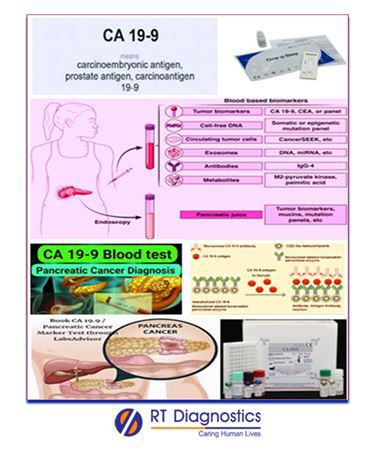CANCER ANTIGEN - CA 19-9
Why Cancer Antigen (CA19-9) Test?
CLINICAL INFORMATION
Screening for Carbohydrate Antigen CA 19-9 is neither specific nor sensitive enough for cancer diagnosis and hence CA test in conjunction with information from clinical evaluation of the patient and other diagnostic procedures for evidence can provide effective early diagnosis. Healthy people have small amounts of CA 19-9 in their body and higher levels may be an early sign of pancreatic cancer (CA 19-9 is a carbohydrate antigen released mainly by pancreatic cancer cells); but not every patient with pancreatic cancer will have high CA 19-9 levels, and also sometimes high levels can also indicate other types of gastrointestinal cancers (bile duct cancer, cancer of the stomach, colon cancer, etc) or non-cancerous disorders – like infections of pancreas, liver and gall bladder (pancreatitis, cholangiocarcinoma, cholestasis, bile duct blockage, liver diseases, cystic fibrosis, etc), thus this test result is not reliable –hence needs confirmatory studies. Cancer Antigen CA19-9 is a tumor marker present in the blood. Tumor markers are unique biomolecules synthesized by the cancer cells or by normal cells ( in response to cancer in the body). Some rare genetic hereditary disorders do not express CA 19-9 with inborn errors of metabolism – such as enzyme deficiency of fucosyltransferase (since this enzyme is required for the synthesis of CA 19-9). Cancer Antigen CA19-9 test may be performed for diagnosing cancer (pancreatic cancer and other cancers of the digestive tract) and other medical conditions (Non-Cancerous conditions like liver cirrhosis - scarring of the liver, gall stones, etc) or for cancer prognosis – evaluating cancer treatment: effectiveness of cancer treatment for cancer regression /patient’s response to treatment, to prevent from metastasis or to rule out recurrence of cancer (Monitoring Cancer Recurrence). Symptoms of pancreatic cancer are abdominal pain that radiates to the back, loss of appetite, unintended weight loss, jaundice, light-colored stools, dark-colored urine, itchy skin, blood clots, diabetes (insensitivity to treatment). Other tests include RIA, ultrasound, etc.

General Instructions:
Sample Requirement: Specimen - Blood sample collected from the vein. Test Preparation: None.
NOTE - Sample for specimen collections may vary based on the patient’s condition/cases according to the patient’s presenting complaints/signs or symptoms:
SPECIMEN REQUIREMENT (Special or Rare Cases) - As instructed and guided by Physician / Clinician / Pathologist / as per Laboratory’s requirements, according to procedures and protocols.
Sample Requirement: Blood Sample taken from the vein
Test Preparation: None
This Multi-Specialty Clinical Referral Laboratory RT DIAGNOSTICS provides precise and accurate tests with an extensive range of testing services to the medical centers to help in the diagnosis and identification of pathology in the test specimens for infectious diseases and also to evaluate the function of organ systems of the patient. It prevents further complications and helps to stabilize and restore health to near normalcy at the earliest without delay.



